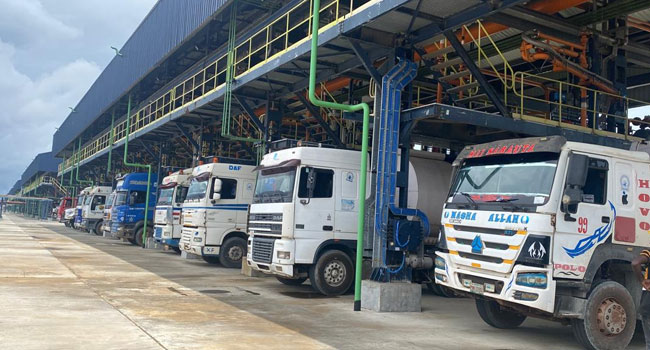The Dangote Petroleum Refinery has marked a significant milestone by exporting two cargoes of jet fuel, totaling approximately 130 million liters, to Saudi Arabia.
This development aligns with the Organisation of Petroleum Exporting Countries’ (OPEC) earlier projections that the 650,000-barrel-per-day refinery could reshape global crude and product markets.
Aliko Dangote, President of the Dangote Group, described the latest fuel export as a realization of the company’s strategic goals.
The move also signals Nigeria’s growing ambition to position itself as a refining hub, particularly in the Middle East, amid the decline of refining operations in some Western nations.
In December 2023, the Nigerian National Petroleum Company Limited (NNPCL) announced the sale of Port Harcourt’s Low Sulphur Straight Run fuel oil (LSSR) to Gulf Transport and Trading Limited, a Dubai-based firm, further reinforcing Nigeria’s push into the international fuel market.
Following a visit by the Nigerian Economic Summit Group (NESG) to Dangote Fertiliser Limited and the refinery in Ibeju Lekki, Lagos, Dangote revealed that output at the facility has now reached 550,000 barrels per day.
“We are achieving the ambitious targets we set, and I am pleased to confirm that we have successfully exported two cargoes of jet fuel to Saudi Aramco,” Dangote said.
He emphasized the critical role of the private sector in national development, arguing that Nigeria’s economic challenges could be mitigated through increased employment and industrial growth.
Dangote also challenged the idea of unrestricted free markets, pointing out that major economies like the United States and China actively protect their domestic industries to safeguard jobs and promote self-sufficiency.
Drawing an example from Benin Republic, he noted that the country restricts cement imports to protect its local industries, even though his Ibese cement plant is only 28 kilometers away.
“The President of Benin is a personal friend, yet they refuse to allow imports to protect their local industries, most of which are grinding plants,” he stated.
Dangote further stressed the benefits of a thriving private sector for the Nigerian government, noting that 52 kobo of every naira generated by Dangote Cement goes directly to government revenue.
Despite his company’s success, Dangote acknowledged the significant hurdles of setting up industries in Nigeria, particularly the high cost of investment due to inadequate infrastructure.
NESG Chairman, Niyi Yusuf, commended Dangote’s efforts, describing the refinery as a game-changer for Nigeria’s economic aspirations.
“For Nigeria to reach its $1 trillion economy target, major investments are required, particularly from the private sector. This refinery, along with the fertiliser plant, petrochemical complex, and associated infrastructure, is a monumental step toward that goal,” Yusuf said.
He also highlighted the role of local industries in driving Nigeria’s industrialization and supporting the growth of small and medium-sized enterprises (SMEs).

















